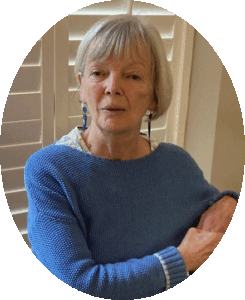Mary Marken
 I was born and bred on the Falls Road in Belfast. I was in my late teens and still at school, when the Northern Ireland Civil Rights Association organised its first march in 1968, calling for an end to discrimination against Catholics and Nationalists. In the year that followed, civil rights marches were attacked by Protestant loyalists, and protestors clashed with the predominantly Protestant Royal Ulster Constabulary (RUC).
I was born and bred on the Falls Road in Belfast. I was in my late teens and still at school, when the Northern Ireland Civil Rights Association organised its first march in 1968, calling for an end to discrimination against Catholics and Nationalists. In the year that followed, civil rights marches were attacked by Protestant loyalists, and protestors clashed with the predominantly Protestant Royal Ulster Constabulary (RUC).
This erupted into five days of political and sectarian violence in August 1969, starting in the Bogside in Derry before spreading to Belfast when a loyalist mob rampaged through Bombay Street on the lower Falls, throwing incendiary devices into residents’ houses and burned the street down. The morning after, I stood with my parents and siblings at our front door in the middle Falls Road and watched a line of lorries and black taxis evacuating families from the lower Falls. Schools in nearby safe areas were quickly turned into refugee centres. My friend, Maura and I spent the time left before we started Queen’s University, helping at one of these in Andersonstown. On 14th August, the British Army were sent in to restore order. The Troubles had arrived and would last thirty years.
On graduating from Queen’s University in 1973, I became involved in cross-community work. I then worked with the Northern Ireland Association of Youth Clubs, running residential development programmes which brought together young people and youth workers from both communities. The collective creativity, good will and heartfulness of the many people I met in those years were an important antidote to what had gone before.
That period up until I left Belfast in 1982 has shaped me That period of my life has shaped the rest of it and has been at the root of what I’ve been drawn to write. It is the subject of my memoir which I am currently writing. From March, you will be able to read occasional excerpts from this.
In 1982, I left Belfast for England to work for one of the national youth organisations. I had never imagined that I would ever choose to live in England. And yet, the move was the right one for me. It gave me the space and distance from which to process and reflect on where I’d come from. Writing was always an important part of my work. Now, I rediscovered an early impulse to write for myself. I began journaling, a practice which I continue forty years on.
I attended an Arvon Foundation course in the mid eighties, and was very fortunate that Frances Molloy (1947 – 1991) was one of the two tutors on the first course. She was a few years older than me and from Dungiven in County Derry. I cannot imagine a better person to make sense of the stream of consciousness that I was writing then. I felt seen, understood and affirmed. A decade before I started training as a psychotherapist, I’d experienced the therapeutic power of writing and of being heard and understood.
Fast forward to 2011. Prompted by seeing The Habit of Art by Alan Bennett at the National Theatre in 2009, I finally honoured my desire to write and signed up for a 3 year part-time Certificate in Creative Writing at The Institute for Lifelong Learning (TILL) at Sheffield University. In my reflective commentary at the end of my first module, I wrote;
I want to develop the habit of writing …The realisation that one needs a habit seems so blindingly obvious and yet feels like a revelation. So I speculate that it reflects a deeper shift in my attitude towards myself as a writer – some level of belief that means I am now willing to make a consistent effort.
If you wish, you can read what happened next by clicking Writing Belfast Song.
